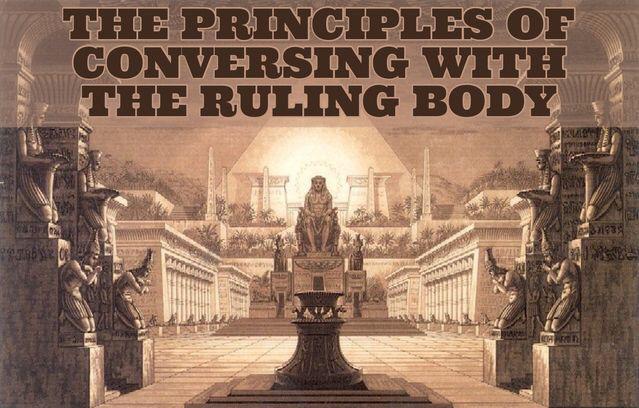(Although he/she may be the universal symbol of cruelty)
THE PRINCIPLES OF CONVERSING WITH THE RULING BODY
God speaking to Moses↓
“Take your brother with you and go with My Messages. Do not be negligent in My remembrance”.
“Go, both of you to Pharaoh, for he has transgressed all boundaries”.
“Speak a soft word to him so that he may pull himself together or even feel afraid”.
They said, “Our Lord, We fear that he may commit some excess against us, or exceed all bounds in transgression”.
God reassured them “Have no fear! I am with you, hearing and seeing”.
The Quran (20:42-46)
THE GUIDELINE
1) “Go with My signs/messages” (20:42).
Our communication even with the most brutal governing figure should be oriented around the verses of God. As we have a certain point-of-view on a matter, the opposing party has such subjective thoughts as well. Both the arguments coming from different sides can be evaluated; and if they are not grounded in the solid truth, they can definitely be objected. Such argumentation will never come to a healthy end.
Nonetheless, God’s verses are universal in encompassment and they comply with the rules of creation. They thus can never be disproved in any culture or ethos in any period of time. The only negative reaction they are likely to receive is not being accepted by individual or collective means. In such scenarios, the people that stand against the verses took over a heavy responsibility. The entity they have taken responsibility against is God Himself. Even the most fierce person will think twice when behaving against the words of God, because the verses God has sent down are in complete harmony with the life/system/world He has created. Human beings cannot object to comply with His commands, just the way they cannot say “I do not drink water”.
2) “Do not be negligent in My remembrance” (20:43).
We should always be mindful of the fact that the only being which should be worshipped is God. The word dhik’rī (My remembrance) mentioned in this verse refers to keeping the correct information about God constantly active in our minds. In summary, God decrees: do not be a slave to the party you are communicating with. He/she is also the slave of God. Stand tall!
There is no one but God who we will give an account of our behavior. If our evidence is positioned in line with His irrefutable messages, what could possibly be in our head other than Him?
Pay attention that this warning was directed to two messengers of God (Moses and Aaron). Being a prophet does not make the human privileged.
3) “Speak a soft word to him” (20:44).
Our argumentation can not involve defamation or violence even against Pharaoh. This rule would not ever change even if you were the messenger of God and the evidence you had in hand were the verses of God. We can not take refuge in the mentality of “I have The Master of all beings on my side” and act unkindly.
Anger can be a useful tool if it is channeled into productive outlets. But taking to the streets in loud voices and damaging the properties of other innocent people is a manifestation of immaturity, not a proper way of expressing oneself.
Moses (pbuh) had prayed to God before he met Pharaoh in his seat. In his prayer, the only thing Moses wished for was neither physical capability nor military power; but articulate speech for himself.
He said, “O Lord, expand my chest for me. Ease my task for me. Untie the knot from my tongue, so that they understand my speech thoroughly” (The Quran 20:25-28).
As we can conclude, if we perform according to orders of God on how to communicate with governing bodies, maybe he/she “will pull himself together or even feel afraid”.
4) “Our Lord, We fear that he may commit some excess against us, or exceed all bounds in transgression” (20:45).
Being shy, having fear of injustice and humiliation are completely normal states of emotion. We are human beings. There is no reason to disparage anyone about having psychological complexities during difficult conditions. However, do not forget that it is God who is saying: “Have no fear! I am with you, hearing and seeing”. It is sufficient for us that He is hearing and seeing.
Even if we base our stance on God’s verses, our purpose cannot be getting the immediate result. Our one and only goal has to be “applying the correct methodology while hoping to achieve the intended result”. Because it is possible that we may lose our life before the completion of the case. “This moment itself” is the age of death and we will begin to be judged by God as we die. In any case, our goal must be nothing but doing the right at the moment we currently experience.
We may die any moment and will be responsible for our own acts and decisions. Did you take this responsibility? Did you accept this burden?








Add comment